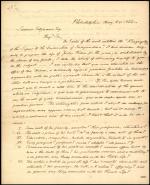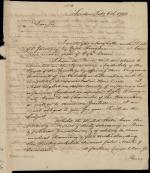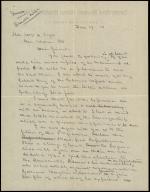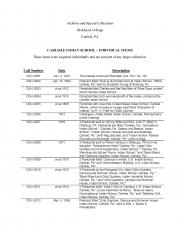Letter from Richard Rush to Gore Ouseley

Richard Rush writes Sir Gore Ouseley and encloses two short notes with autographs from Presidents George Washington and Thomas Jefferson.


Richard Rush writes Sir Gore Ouseley and encloses two short notes with autographs from Presidents George Washington and Thomas Jefferson.

Diplomat Richard Rush writes to Colonel Thomas Aspinwall, American consul in London, requesting that he assist an American citizen holding property in London's Covent Garden neighborhood.

Author Robert Waln, Jr.

Dickinson College Trustee James Wilson writes to William Bingham regarding a loan Wilson seeks from an unspecified Mr. Lettsom.
Horatio King responds to a request for his autograph. The note may have been removed from the bottom of a letter.

Horatio King writes former Indiana Governor Thomas A. Hendricks to welcomes him home from a trip abroad and requests that he read the enclosed "Centennial" brochure.

Horatio King writes to J. H. Weeks, Jr., and explains why Weeks will not receive President James Buchanan's autograph. "I regret that I have no autographed letter of President Buchanan that I am willing to part with," as King notes.

Horatio King writes Postmaster General Donald McDonald Dickinson and thanks him for sending a copy of his annual report.

Statesman William Bingham writes from Paris to Benjamin Rush in Philadelphia. Bingham responds to Rush's previous displeasing letter and discusses United States politics and his travels abroad. Transcript included.

William Bingham writes to Thomas Fitzsimons on Britain's attitude toward the United States in political and commercial affairs. Bingham is a member of the Dickinson College Board of Trustees.

Benjamin Rush writes to Thomas Fitzsimons about a recent funding law and business conditions in the United States. While "lands sell and settle rapidly," Rush argues that "our vitals are unsound and we must finally perish under the weight of Mr.

John Dickinson acknowledges the receipt of Benjamin Rush's pamphlet and mentions that he would only reenter Pennsylvania affairs to serve America.

Matthew Boulton provides an account of the Birmingham riots in England and the destruction of property, including Joseph Priestley's house. The recipient's identity is unknown. Transcript included.

Joseph Priestley writes to George Thatcher regarding news from England, where Priestley expects revolution: "The unanimity you speak of in this country does not exist in this neighborhood.

Secretary of State Timothy Pickering writes Charles Hall of Sunbury regarding Joseph Priestley's "unpardonable" conduct and the receipt of "Mr.

Statesman William Bingham writes Benjamin Rush and compares the conditions in England with those in the United States in terms of government, economics, and immigration.

Medal of Honor Recipient Horatio Collins King (Class of 1858) drafts a letter to President William H. Taft, disagreeing with Taft on the future of the Progressive Party.

Theologian and scholar Joseph Priestley writes to his friend Theophilus Lindsey.

The collection contains correspondence, pamphlets, and photographs of Dr. Annie (Wood) Besant (1847-1933), a prominent and revolutionary freethinker of the late nineteenth and early twentieth centuries. Besant was a Christian wife and mother who later in life became an Atheist doctor and activist. She became active in social reform after her children had been taken from her following her separation from her husband. In her later years Besant moved to India to help champion the cause of home rule in that country. The correspondence consists mainly of letters from Besant to her friends, family, and colleagues in the United States, England, and India. A particularly noteworthy letter is one written to Besant from Mohandas Gandhi. Also included in the collection are pamphlets written by Besant, a stamp from India dedicated to her honor, and several photographs of Besant.

James Buchanan was a graduate of Dickinson College, Class of 1809, who went on to become the fifteenth president of the United States. The majority of this collection is comprised of correspondence between Buchanan and his business and political associates; over four hundred letters penned by Buchanan are included in the collection. Drafts of speeches, printed pamphlets, and various memorabilia are also represented.

This collection is comprised of three journals containing notes on lectures delivered by Pieter Burman during his tenure at the University of Leiden, sometime between 1715 and 1740. It is not known precisely who took these notes. The notebooks themselves are believed to have been donated to Dickinson College by Rev. John Erskine not long after the college was founded, as the binding and content is consistent with numerous other works he donated.
Burman’s lectures follow the basic structure of Torsellino’s History, (i.e. the division of chapters and sections), but they expand on those divisions, adding further information and context. More specifically, the focus of the lectures appears to be on the language, history, and poetry of the United Provinces.
The lectures are recorded through three journals. The first journal, Volume 1, contains a prologue as well as Book I of Torsellino’s History, concerning biblical history divided according to important figures and patriarchs. The second journal, Volume 2, follows Torsellino’s Books V-VIII. The third journal, Volume 3, follows Torsellino’s Books IX-X.

This collection contains a number of items purchased as a group from Robert Rowe in 2014, and features the business papers of Milton I. Zeigler, postcards, ephemera, and publications from the Carlisle Indian School. Zeigler served as the industrial instructor for the shoe and harness department at the Carlisle Indian School from about 1901-1909. His business papers include correspondence with government agents and material suppliers as well as vouchers for expenditures during various business trips. The postcards in this collection all feature images of the Carlisle Indian School. The ephemera in this collection include commencement programs and quotation cards printed by the Carlisle Indian School Press. The Publications section includes multiple government publications about the Carlisle Indian School as well as souvenir booklets about the school and a copy of Stiya: A Carlisle Indian Girl at Home, written by school matron and printing supervisor Marianna Burgess.
Most of the materials in this collection are available online at the Carlisle Indian School Digital Resource Center.

This collection contains a series of letters received by Dr. Cornelius Rea Agnew, a noted surgeon from New York City who was a strong supporter of, and significant donor to, the Carlisle Indian Industrial School. The majority of the letters were written by Richard Henry Pratt, and discuss a number of topics including donations to the school, renovations and purchases for the campus, Pratt’s attempts to gain further support and funding from politicians in Washington, and various trips undertaken by the two for the benefit of the school. One letter, from Acting Secretary of the Department of the Interior M. S. Juslyn, discusses approval for funding for one of Agnew’s trips to the American West, and two letters from Amy A. Carothers, an early teacher at the school, discuss activities in her classroom.

These items about the Carlisle Indian School were acquired by the Dickinson College Archives and Special Collections individually and are not part of any larger collection.

This collection consists of drafts, letters, manuscripts, notes, financial accounts, and a prospectus for the publication of a book. Specifically, there are lectures and notes on mechanics, as well as drafts for patents on inventions submitted to the Royal Commissioners of the Great Exhibition of 1850, including an air engine. The collection also includes letters and papers on W. L. Henson's Knitting Machine, plans and contracts for the establishment of railways and public works in India, and photographs of the "New" Lebaudy Airship and Airship Hanger.